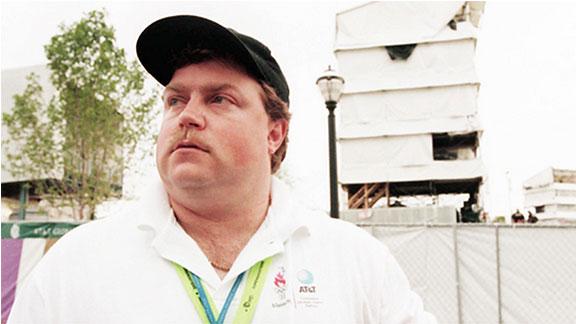 ESPN's 30 for 30 documentary series is aimed at highlighting people or events that received little attention or did not get their due. That philosophy has carried into their online-only 30 for 30 Shorts series, with wonderfully-produced short films about people and events you should know about. Thanks to a tweet by NPR's Linda Holmes, I was alerted to the release of Judging Jewell, a thoughtful and insightful look at a true hero who mistakenly got labelled as a villain.
ESPN's 30 for 30 documentary series is aimed at highlighting people or events that received little attention or did not get their due. That philosophy has carried into their online-only 30 for 30 Shorts series, with wonderfully-produced short films about people and events you should know about. Thanks to a tweet by NPR's Linda Holmes, I was alerted to the release of Judging Jewell, a thoughtful and insightful look at a true hero who mistakenly got labelled as a villain.On July 27, during the 1996 Atlanta Summer Olympics, a bomb went off in Centennial Olympic Park. 111 people were injured and 2 died, but the death toll could have been even higher were it not for Richard Jewell, a security guard who spotted the suspicious-looking backpack containing the bomb. He raised the alarm and helped clear the immediate area, but the bomb went off before everyone could leave. In the immediate aftermath of the incident, Jewell was rightfully hailed as a hero, a man who had saved hundreds of lives with his quick thinking. But as officials scrambled to find out who the bomber was, and members of the media were rushing for a story, things took an ugly turn. The FBI suddenly decided that Jewell might fit the profile of a bomber, and once the media discovered he was a suspect, all hell broke loose.
For 88 days, Jewell was subjected to libelous attacks, unable to leave his home without being tailed by the FBI and followed by the press. The Atlanta newspaper spun stories about his possible involvement in the bombing, reporting on half-truths and speculation, and the journalists who had embraced him as a hero just a few days ago, ferociously turned on him, convinced that he was the villain. He was cruelly treated and misrepresented, until October 1996, when he was finally cleared of all suspicion. In 2005, he was completely exonerated when Eric Robert Rudolph was convicted for the bombing and sentenced to life imprisonment.
Judging Jewell is only 20 minutes long but it is a powerful tale about the power of the media to influence and distort public perception. You may be innocent until proven guilty in a court of law, but the media has no such scruples. Richard Jewell was a man who should have been honored and celebrated for his bravery on June 27, 1996. Instead he was treated with suspicion and hostility, and never recovered from his fall from grace. He died in 2007 believing that he would never be remembered for his good deeds. Therefore, Judging Jewell is a vital documentary, a chance to recognize this man as the hero he was and restore the memory of his good name.
No comments:
Post a Comment